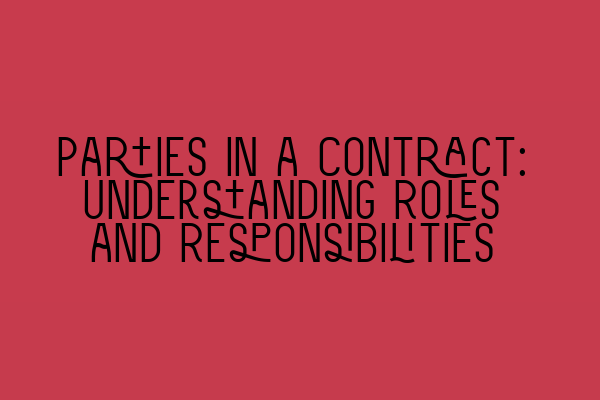Parties in a Contract: Understanding Roles and Responsibilities
Contracts are the backbone of every legal agreement, outlining the rights and obligations of the parties involved. Whether you’re drafting a contract or entering into one, it is crucial to understand the roles and responsibilities of each party. This article aims to provide a comprehensive guide to help you navigate the world of contract law.
The Two Main Parties in a Contract
Before delving into the specific roles and responsibilities, it’s important to identify the two main parties in a contract:
- The offeror – the party making the offer
- The offeree – the party receiving the offer
These two parties play distinct roles in a contract and have corresponding responsibilities that need to be fulfilled.
The Role of the Offeror
The offeror initiates the contract by making a proposal to another party. Their primary role is to outline the terms and conditions of the agreement. The offeror must ensure that their offer is clear, specific, and communicated effectively to the offeree.
It is important for the offeror to understand the legal implications of their offer. They must ensure that the terms are lawful, enforceable, and do not violate any existing laws or regulations. Having a solicitor review the contract before making the offer can help avoid legal pitfalls. Seek professional guidance to ensure your offer is legally sound.
Furthermore, the offeror has a duty to keep the offer open for a reasonable period of time, as determined by the circumstances. They also have the right to revoke or withdraw their offer if the offeree has not yet accepted it.
Offerors hold a position of power in contract negotiations, and they need to exercise this power responsibly and ethically. A fair and reasonable offer sets the tone for a successful contractual relationship.
The Role of the Offeree
As the offeree, your role is to receive the offer made by the offeror and respond accordingly. The offeree has three options:
- Acceptance: If the offeree agrees to the terms outlined by the offeror, they can accept the offer either explicitly or implicitly. Explicit acceptance involves clearly communicating acceptance to the offeror, while implicit acceptance occurs when the offeree performs an act consistent with acceptance.
- Counteroffer: In certain situations, the offeree may wish to negotiate the terms of the original offer. In this case, they can make a counteroffer, proposing alternative terms. This counteroffer terminates the original offer, and the roles are reversed – the offeree now becomes the offeror, and the original offeror can accept or reject the counteroffer.
- Rejection: If the offeree does not wish to accept the offer or propose alternative terms, they can simply reject the offer. This terminates the offer, and no contract is formed between the parties.
It is important for the offeree to respond to the offer within a reasonable time frame. Failing to respond may be construed as rejecting the offer. The offeree should also be aware of any additional obligations or conditions stated in the offer, such as the need for written acceptance.
Understanding your role as the offeree empowers you to make informed decisions and protect your rights. Seek legal advice if you have any doubts or concerns about the terms and conditions of the contract.
The Importance of Clarity in Contracts
Contracts are legally binding documents, and clarity is key when it comes to outlining the roles and responsibilities of each party. Ambiguities or vague language can lead to misunderstandings, disputes, and potential legal consequences.
Consulting a solicitor to draft or review your contract ensures that the language used is clear, concise, and legally sound. A solicitor’s expertise can help you avoid potential pitfalls and safeguard your interests.
Conclusion
Understanding the roles and responsibilities of parties in a contract is crucial for ensuring a smooth and successful agreement. The offeror holds the responsibility of making a clear, lawful, and fair offer, while the offeree has the power to accept, reject, or propose counteroffers.
Clarity and legal accuracy are fundamental in contracts, and seeking the guidance of a solicitor is highly recommended. If you would like further insights into legal practice and decision-making, or want to learn more about becoming a solicitor, explore these related articles:
- Unveiling Real-Life Case Studies: Insights into Legal Practice and Decision-Making
- Exploring Solicitor Salaries in the UK: Average Earnings and Factors Affecting Income
- Pursuing a Law School Education in the UK: Choosing the Right Path for Your Future
- Securing Training Contracts: A Roadmap to Becoming a Solicitor
- Mentorship for Aspiring Solicitors: Nurturing Talent in the Legal Field
Remember, understanding the roles and responsibilities of parties in a contract is crucial for protecting your rights and ensuring a successful agreement. Seek expert advice, draft clear contracts, and enter into agreements confidently.
